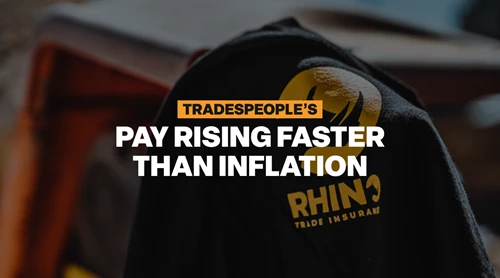
Tradespeople's Pay Rising Faster Than Inflation
Tradespeople’s pay is rising faster than inflation. Learn what’s behind the increase, which trades earn most, and how Rhino can help protect your business and income.
Running a business as a dressmaker, tailor, or curtain maker involves more than just mastering the art of sewing and design. It involves dealing with various risks, from handling expensive fabrics and equipment to managing customer expectations. In this blog post, we’ll explore how securing the right insurance can protect your business, encourage more customers to trust your services, and ultimately help your business thrive.
Whether you work from a dedicated workshop or your home, your space is filled with valuable equipment and materials. Sewing machines, rolls of fabric, and bespoke orders represent significant investments. A fire, flood, or break-in could cause substantial damage, leading to costly repairs or replacements.
Even with all the care in the world, mistakes can happen. Perhaps a dress doesn’t fit as expected, or a curtain has a flaw. These issues can lead to dissatisfied customers. In extreme cases, a dispute might escalate to a legal claim, necessitating expensive legal defence and settlements.
If a customer visits your workshop or if you work on-site at a client’s home, there’s always a risk of accidents. A customer might trip over a misplaced item, or a needle might cause an injury. Without proper insurance, you could be liable for costs and compensation.
Insurance offers you a safety net, ensuring that your business can bounce back quickly from unforeseen events. If your equipment is damaged or stolen, insurance can cover the replacement costs.
When customers know that you have comprehensive insurance, they’re more likely to trust you with their valuable materials and projects. It demonstrates professionalism and a commitment to quality service, which can be a clear competitive advantage.
If you take out an insurance policy to cover legal defence costs, this can be invaluable if you face a claim. This protection allows you to focus on your craft without the constant worry of potential legal battles.
Let’s look at a few scenarios where insurance can make a difference:
Example 1: The Seamstress’s Sanctuary
Sarah, a dressmaker, runs a small boutique. One night, a fire breaks out due to an electrical fault, destroying her sewing machines and several custom-made dresses awaiting pickup. Fortunately, Sarah’s business insurance covers the cost of the machines and compensates her customers for the lost dresses, allowing her to get back to work quickly without ay negative financial impact.
Example 2: The Tailor’s Tussle
John, a skilled tailor, alters a wedding suit for a client. Despite John’s best efforts, the client claims the suit doesn’t fit properly on the big day and demands a refund and compensation. John’s insurance covers the cost of the refund and any additional legal fees, protecting his reputation and finances.
Example 3: The Curtain Maker’s Catastrophe
Emma, a curtain maker, installs custom drapes in a client’s home. During the installation, a ladder fell and damaged the client’s expensive antique table. Emma’s insurance covers the repair costs, ensuring her client is satisfied, and her business relationship remains intact.
Insurance not only protects your business but also acts as a powerful marketing tool. When potential customers see that you are fully insured, they feel more secure entrusting you with their projects. It shows that you are a responsible professional who takes your business seriously.
Here’s how you can leverage insurance to attract more customers:
Q: What insurance should I consider for my business?
Key insurance types include Public Liability Insurance, Professional Indemnity Insurance, Tools Insurance, and Personal Accident Insurance. Each covers different aspects of potential risks.
Q: How much does insurance typically cost?
The cost of your insurance varies based on factors such as the size of your business, the type of work you do, and your claims history. Getting a personalised quote from an insurance provider like Rhino Trade Insurance is the best way to determine the exact cost.
Q: Is insurance mandatory for dressmakers, tailors, and curtain makers?
While not legally required, having insurance is highly recommended. It protects you from financial loss and enhances your professional credibility.
Insurance is not a one-size-fits-all solution. Different trades have unique risks and requirements. Here are some common types of trade insurance available to tradesmen and women:
Rhino Trade Insurance stands out for several reasons:
As a dressmaker, tailor, or curtain maker, your skills and creativity are your greatest assets. However, running a successful business also requires protecting yourself from potential risks. Insurance offers the financial security and peace of mind you need to focus on your craft and grow your business.
By choosing a reliable insurance provider like Rhino Trade Insurance, you can ensure that your business is well-protected, allowing you to provide exceptional service to your customers and thrive in your trade.
Tradespeople’s pay is rising faster than inflation. Learn what’s behind the increase, which trades earn most, and how Rhino can help protect your business and income.
Retirement can seem like a distant dream when you’re busy on the tools, but a little planning now can make all the difference later. Rhino surveyed 512 tradespeople to find out when they expect to retire, with answers ranging from under 40 to never!
Running a trades business isn’t easy. Rhino surveyed 512 UK tradespeople to uncover their top concerns for 2024. The biggest worries? Lack of work, rising costs, tool theft, and being undercut by competitors.
Tell us your trade and get a tailored insurance quote for your business in seconds
Our team of experts are available to talk to Mon-Fri 08.30-17.30 and Sat 10.00-14.00

